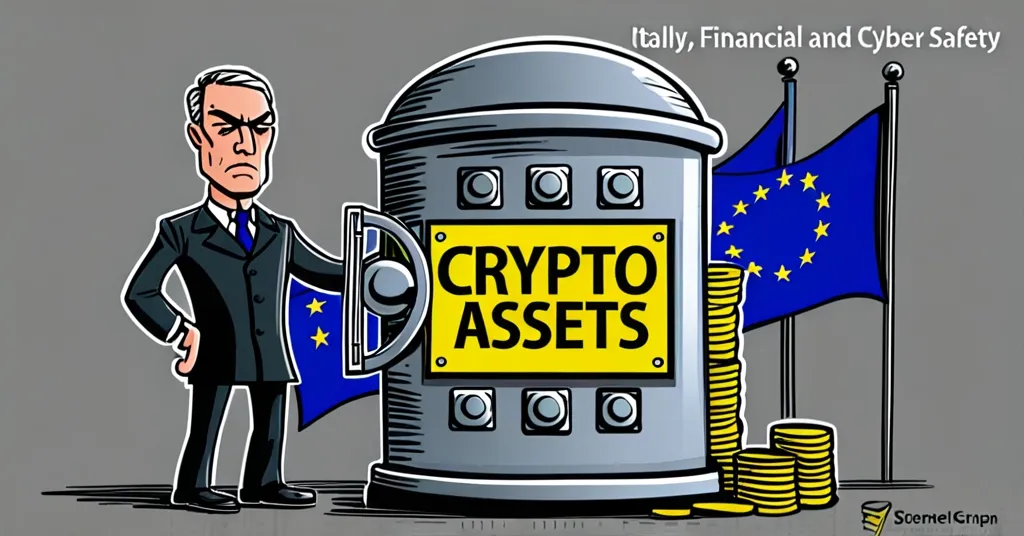Italy Tightens Crypto Regulations: Aligns with EU’s MiCA for Financial and Cyber Safety

Italy Tightens Crypto Regulations For Financial And Cybersecurity Safety
Italy is intensifying its regulatory oversight of cryptocurrency firms to strengthen financial safeguards and cybersecurity. The Bank of Italy and Consob, Italy’s financial markets regulator, are actively engaging with crypto service providers to ensure compliance with the European Union’s Markets in Crypto Assets (MiCA) framework.
- Italy enhances crypto regulations for financial safety and cybersecurity.
- Bank of Italy and Consob align with EU’s MiCA framework.
- Concerns over digital tokens from tech companies on traditional banking.
Governor Fabio Panetta of the Bank of Italy has emphasized the need for robust measures to prevent money laundering and maintain financial stability as the crypto sector grows. At the 31st Assiom Forex Congress on February 15, Panetta expressed, “As the crypto sector gains mainstream adoption, authorities must tighten safeguards to prevent financial instability and illicit activities.” This approach highlights Italy’s intent to align closely with EU standards while addressing potential risks. You can read more about his speech here.
The Bank of Italy and Consob are in deep discussions with crypto firms to ensure they meet the new regulations set by the MiCA framework. MiCA, or Markets in Crypto Assets, is a set of EU regulations designed to regulate the crypto market, categorizing crypto-assets into electronic money tokens (EMTs), asset-referenced tokens (ARTs), and other crypto-assets. Italy’s proactive stance aims to prevent illicit activities and ensure market stability, with penalties for non-compliance ranging from €2,066 to €10,329 for criminal offenses and up to €15 million or 15% of annual turnover for administrative sanctions. More details on these penalties can be found here.
Italy’s regulatory measures also include strict policies against insider trading and market manipulation. Insider trading refers to the illegal practice of trading on the stock exchange to one’s advantage through having access to confidential information. Market manipulation involves actions that artificially influence the price of a security or asset. These measures underscore Italy’s commitment to maintaining integrity within its financial markets.
Panetta also raised concerns about the potential impact of digital tokens issued by tech giants on the traditional banking system, warning, “Widespread adoption of these assets could threaten the traditional banking system as commercial banks might lose a significant portion of their operations.” This highlights Italy’s broader worries about the implications of digital currencies on monetary policy and financial stability. For more insights on this topic, visit this discussion.
Italy’s regulatory approach contrasts with the more fragmented U.S. system, where crypto regulations often develop on a case-by-case basis. Panetta noted, “Regulatory inconsistencies between the US and Europe could create loopholes that crypto operators might exploit.” This statement calls for a coordinated global effort to regulate the burgeoning crypto market effectively. Learn more about the differences between EU and US crypto regulations here.
Italy’s alignment with the MiCA framework sets a precedent for other nations, reflecting a broader trend toward balancing innovation with financial security. The country is also increasing surveillance to mitigate liquidity and cybersecurity risks. Liquidity risks refer to the potential for assets to be hard to sell without significant price changes, while cybersecurity risks pertain to the threats of hacking and data breaches in the crypto space.
However, not all views on Italy’s regulatory approach are unanimously positive. Some critics argue that overly stringent regulations might stifle innovation and deter crypto firms from operating in Italy. The transition to Crypto-Asset Service Providers (CASPs) involves stringent requirements, including specific corporate structures and compliance with international financial reporting standards, which could pose challenges for smaller firms. Discussions on this topic can be found on Reddit.
Despite these concerns, Italy’s updated regulatory framework includes a segregation regime for crypto-assets and funds held by CASPs, ensuring they are protected from creditors’ enforcement actions. This measure aims to enhance the operational integrity of crypto firms operating within Italy.
Ultimately, Italy’s efforts to tighten crypto regulations reflect a commitment to financial stability and cybersecurity while navigating the complexities of digital currencies. As the crypto landscape evolves, Italy’s proactive approach could serve as a model for other nations seeking to establish clear and enforceable crypto frameworks. For more on Italy’s regulatory efforts, visit this article.
Key Takeaways and Questions
- What is driving Italy to strengthen its crypto regulations?
Concerns over financial stability, cybersecurity, and the need to prevent illicit activities like money laundering are driving Italy’s regulatory efforts.
- How does Italy’s regulatory approach align with the European Union?
Italy’s regulations are closely aligned with the EU’s MiCA framework, aiming to provide clear guidelines for the crypto sector.
- What are the differences between European and U.S. crypto regulations?
Europe’s MiCA framework offers a unified approach, while the U.S. typically handles crypto regulations on a case-by-case basis, often depending on whether an asset is classified as a security.
- What risks are Italian regulators focusing on?
Italian regulators are focusing on liquidity risks, cybersecurity risks, money laundering, and the potential impact of digital tokens on the traditional banking system.
- What penalties can be imposed for non-compliance with Italy’s crypto regulations?
Penalties for non-compliance range from €2,066 to €10,329 for criminal offenses and up to €15 million or 15% of annual turnover for administrative sanctions.
- How does Italy view the role of tech companies in the crypto space?
Italy is concerned that digital tokens issued by tech companies could threaten the traditional banking system and weaken central bank control over monetary policy.
- What is the significance of Italy’s regulatory efforts in the global context?
Italy’s proactive approach could serve as a model for other nations seeking to establish clear and enforceable crypto frameworks amid the evolving global regulatory landscape.
As the crypto sector gains mainstream adoption, authorities must tighten safeguards to prevent financial instability and illicit activities.
Regulatory inconsistencies between the US and Europe could create loopholes that crypto operators might exploit.
Widespread adoption of these assets could threaten the traditional banking system as commercial banks might lose a significant portion of their operations.
Without proper oversight, private digital currencies backed by large corporations could weaken central bank control over monetary policy and financial stability.



